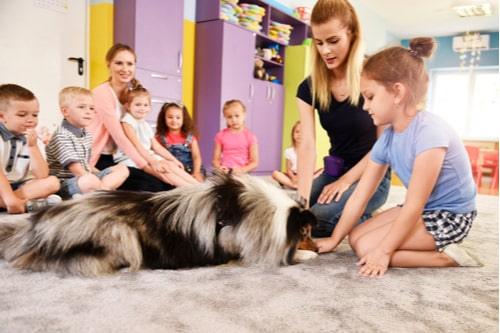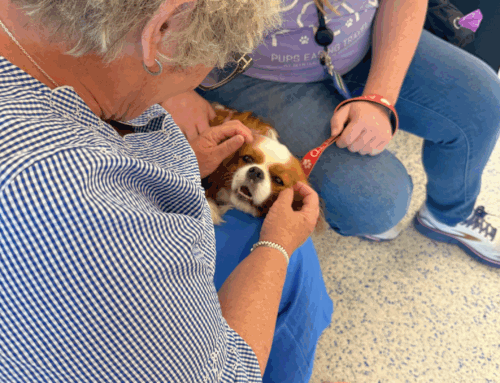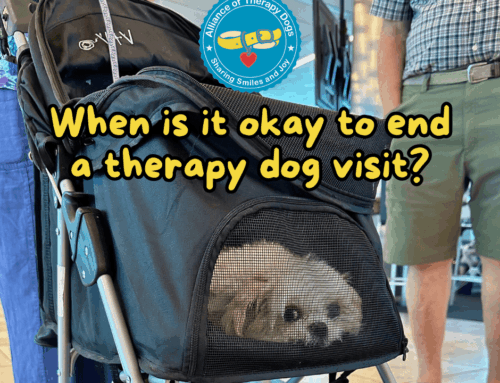Contrary to common belief, therapy dogs have a very different job from service dogs. Therapy dog services are beneficial not just for people teams visit in hospitals and nursing homes but also for students. While service dogs are dedicated to a specific owner, therapy dogs have a much broader role to play, helping people feel and stay calm.
Therapy dogs can be used at an elementary level all the way through college. At Alliance of Therapy Dogs, we have programs where our members’ dogs make lives better in the classroom environment.
So, what are therapy dogs, and how do they help in the classroom? Find out in this guide.
How are Therapy Dogs Different?
Our member therapy dogs are trained and certified to provide support and comfort. They rely on their social instincts and skills to offer socio-emotional, cognitive, and health benefits to the people they spend time with.
Therapy dogs have a lot of benefits to offer to school and university students. The recorded benefits include improving attendance, problem-solving abilities, and improved calmness.
Socio-Emotional Benefits
One of the most significant impacts that therapy dogs can make in the classroom is students’ socio-emotional development. Besides their training, therapy dogs bring their lovable and loving characteristics. These friendly companions are good listeners and offer great companionship and an audience to children without making any judgments.
Students can bond readily with our therapy dogs, feeling more connected and confident. Studies show that this helps reduce negative behavior in children. Spending time with dogs also helps improve children’s mental well-being. There is intense pressure on children in school environments. Therapy dogs help children learn social skills, preventing social isolation.
Interaction with therapy dogs has also been found to cause a social catalyst effect, and this further helps improve the stimulation of social behavior. The relationships between the dogs and students help develop trust in children, and such children are also more likely to develop a broader capacity for empathy.
Cognitive Benefits
Besides positively impacting children’s emotional well-being, therapy dogs also contribute to cognitive development. Some of the key benefits of interacting with therapy dogs are as follows:
- Improved reading skills
- Enhanced executive-functioning skills
- Stimulating memory and problem-solving skills
Studies show that the very presence in an educational environment tends to improve the areas of attention, concentration, relaxation, and motivation. This helps in reducing stress levels that would otherwise affect proper learning.
Relevant Research Studies
According to a 2019 National Institute of Health study, the presence of a dog in a classroom can help promote a positive mood. The study also recorded the notable anti-stress effects on the body of students.
Another University of California study involving canine reading programs made another exciting discovery. Students participating in a program experienced their reading fluency increasing by 12% to 30%.
Benefits for School Students
Numerous research studies have demonstrated how therapy dogs can help address school-age students’ social and emotional learning needs. We have therapy dog programs with a proven track record of improving motivation for learning in children, resulting in improved outcomes.
Therapy dogs are increasingly used to support children in addressing their social and emotional learning needs in schools. This has also been found to help with literacy development. Some of the benefits recorded in school classrooms include:
- Increased school attendance
- Positive changes lead to better learning and enhanced motivation
- Growth in confidence levels
- Development of better and stronger relationships with teachers and peers due to the experience of trust and love with therapy dogs. Children learn ways to express their feelings and develop more trusting relationships
- Reducing learner anxiety behaviors causes improvement in learning outcomes like improved reading and writing skills and levels
Despite these well-established facts about the benefits of therapy dogs for children, many schools still overlook the importance of this strategy. Some of the common concerns that prevent schools from embracing these programs include:
- Sanitation concerns
- Ensuring safe dog temperaments
At Alliance of Therapy Dogs, our therapy dogs are carefully selected, trained, and certified before enrolling in any program.
Benefits for University Students
The benefits of therapy dogs extend across all age groups, and researchers have also found a positive impact in reduced anxiety and stress among university students. According to a study, students spending time in a classroom with a therapy dog experienced improved energy levels and happiness.
Further research is required in therapy dog programs to understand the benefits for students at all levels.
General Benefits of Therapy Dogs
Everyone, including students, can benefit from therapy dog programs. Some of the well-established, general benefits associated with animal-assisted therapy programs are as follows:
- Developing social skills
- Teaching empathy and proper interpersonal skills
- Develop skills to pick up social cues required for human relationships
There is a surge in demand among schools and universities to use therapy dogs to develop better student engagement.
How Do We Help?
At Alliance of Therapy Dogs, we are an international registry of certified therapy dog teams. Our members benefit from our registration, testing, certification, insurance, and support services for animal-assisted activities. We are driven by the goal to build a network of special dogs and their caring owners who are eager to share the joy with people from all walks of life and different age groups.
Our testing process involves ensuring that every dog has the right temperament for being a therapy dog. Our Testers/Observers will observe the dog and its handlers during multiple supervised visits. All our therapy dogs are well-groomed before their school visits and carry up-to-date vaccinations. Every ATD team is insured to protect everyone’s interests.
For any information about our services, feel free to call Alliance of Therapy Dogs at 307-432-0272 or 877-843-7364. You may also write to us using this Online Form,






